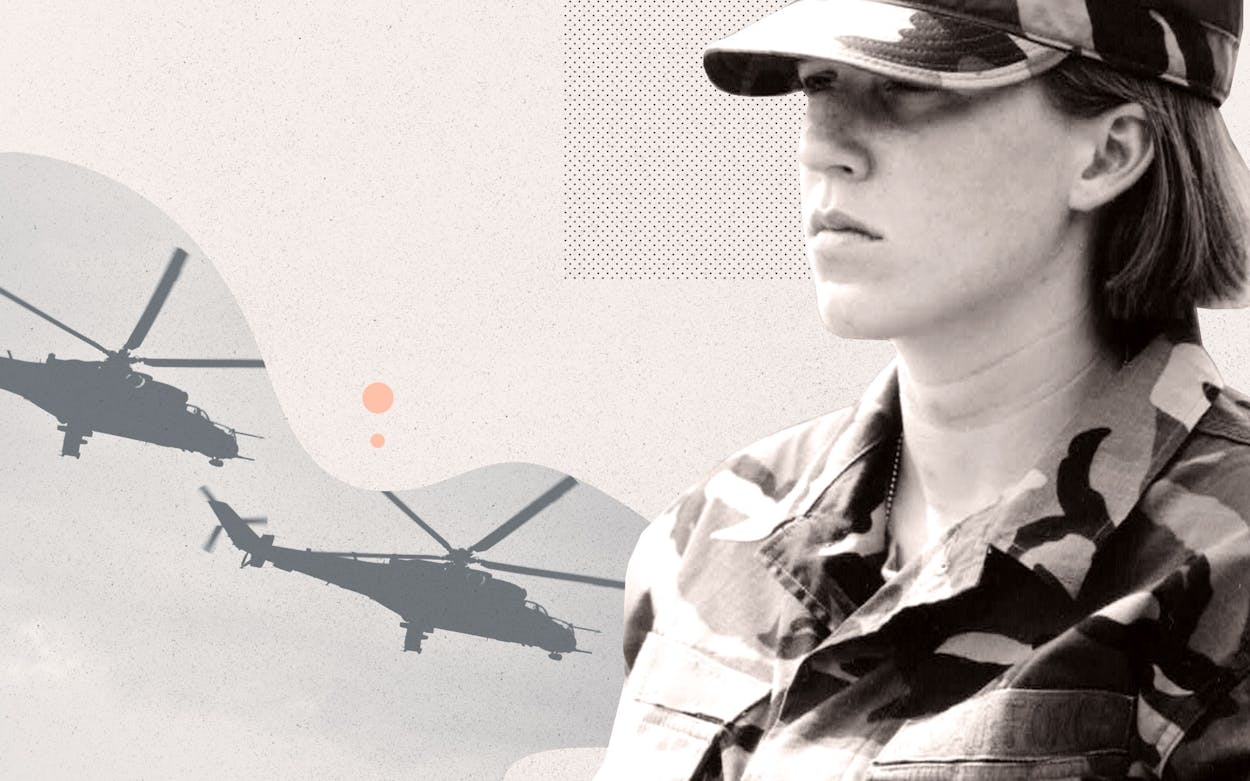I experienced a lot of discrimination in the military. One commander told me that if my time of the month got in the way of my job, he would fire me. An instructor in pilot training continually failed me for subjective things, like judgment and situational awareness—I couldn’t get him to tell me what I was doing wrong. When pressed, he brazenly told me and the second-ranking officer in the squadron that it was because he didn’t think women should be pilots. He wasn’t punished for that, he was just told he couldn’t fly with any more female students. I became a combat pilot despite people trying to stop me.
When I was in my third tour in Afghanistan, I was shot down. I was injured to the point where I couldn’t fly anymore, so I looked into what ground jobs I could do that fulfilled me as an adrenaline junkie and, more importantly, utilized my experience. One of them was perfect for me: special tactics officer. It requires a very specific skill set—being able to think in 3D, maintaining your calm when bullets are flying, being able to speak the language of pilots on the radio—stuff that I had already shown I could do. But I couldn’t apply for it because I was a woman.
I filed a lawsuit [against the U.S. Secretary of Defense, protesting the Combat Exclusion Policy as unconstitutional]. But the lawsuit wasn’t just out of a sense of being wronged or discriminated against. There was a women’s rights aspect to it—someone told my stepdaughter she couldn’t be a Marine, because it was a boy’s job, and I was really sick of people telling little girls what they can and can’t do—but it was just as much a military effectiveness argument. I had already proven that I was an asset to the military, and they were going to lose me over this. Some people are motivated purely by the military effectiveness argument, some purely by the women’s rights argument. For me it was both.
It’s important not to try to convince others of your own reasons for change. Finding the reason why they should want to support your efforts is the key to effective change management. If the effectiveness of the unit is the driving factor and the motivation, show them how this impacts the effectiveness of the unit. Other people are not necessarily going to be morally outraged by the inequality that you experience if they’re not part of the group that’s being targeted. It’s really important to find what drives and motivates other people, instead of trying to convince people of what drives and motivates us.
In the military, there’s a sense of camaraderie that can sometimes make people bystanders. There were a lot of really good men that I served with, but many of them watched me get discriminated against while looking the other way. This is not surprising in a culture of doing as you’re told, depending on the person to your left and right to keep you alive, and not wanting to be alienated from the group. Once people see that this kind of treatment is damaging to the group, that’s when they’ll speak up. We have to change it so that people are more embarrassed to stand by and let it happen than they are to stand up and say something.
Even after the Combat Exclusion Policy was lifted [after the lawsuit], we’ve had reports of women going through Ranger training or an infantry officer course and reporting being asked to do things that the men weren’t even asked to do, or being held to an even higher standard. That’s because there are instructors like the one I faced in pilot training, who are unofficially trying to stop women from graduating from these schools. There’s a lot of barriers, culturally. Changing the rules is the first step, because you can’t change the culture without changing the rules, but that’s only the beginning.
To change the culture, you have to start with pointing out the problem with the status quo. Change is scary, and people don’t like to “fix it if it ain’t broke.” You have to show them how it’s broken: show them the brain drain and the talent drain that happens when you treat women like this. Only then will we be able to take the positive steps toward equality that benefit the community at large.
To see resources about female mentorship, getting involved in local issues, and what to do if you experience sexual harassment, read here.
More from this collection
The Women’s Voices Project
In a series of as-told-to conversations, two dozen Texas women talk about gender, work, and what needs to change for women in their home state. Read their perspectives here.
- More About:
- Politics & Policy
- Military






